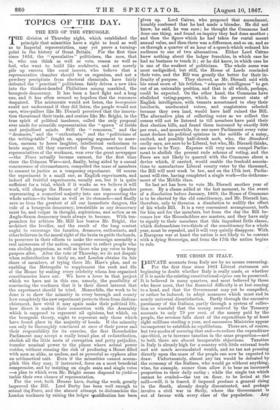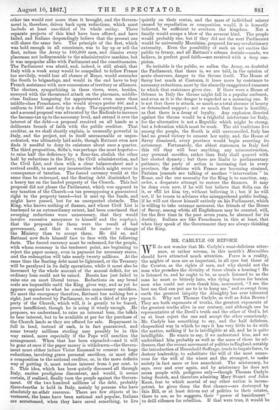THE CRISIS IN ITALY.
PRIVATE accounts from Italy are by no means reassuring. For the first time since 1861 Liberal statesmen are beginning to doubt 'whether Italy is really made, or whether if it is made the existing constitutional regime can be preserved. It is believed in many quarters, and most believed by those who know most, that the financial difficulty is at last coming to a head, and that the Government may yet be compelled, or rather be induced, to adopt measures which must end in nearly universal dissatisfaction. Partly through the excessive parsimony of the Italians, partly through a system of collec- tion so wasteful that the money received by the Treasury amounts to only 79 per cent. of the money paid by the• people, the revenue falls short of the expenditure by at least eight millions sterling a year, and successive Ministries appear incompetent to establish an equilibrium. There are, of course; but two modes of securing that end—to reduce the expenditure ope-third, or to increase taxation in the same proportion—and to both there: are almost insuperable objections. Taxation in Italy is already high for a country with little external trade and not much accumulated wealth, and no tax not pressing directly upon the-mass of the people can now be expected to draw. Unfortunately, almost any tax would be defeated by the economy of the Italians, who would go without anything, wine, for example, sooner than allow it to bear an increased proportion to their daily outlay ; while the single tax which cannot be evaded—the tax on flour, to be levied at the mill—will, it is feared, if imposed produce a general rising in the South, already deeply discontented, and perhaps involve a civil war in Sicily, where the Government is ether tax would cost more than it brought, and the Govern- ment is, therefore, driven back upon reductions, which twist include at least one-third of its whole outlay. Three -separate projects of this kind have been offered, and have failed, and Italians despondingly believe that the present one will share the same fate. The principle of the first, which was bold enough in all conscience, was to lay up or sell the fleet, reduce the Army to 100,000 men, and dismiss every placeman not indispensable to the administrative machine, but it was unpopular alike with Parliament and the constituencies. The Parliament was afraid, and, indeed, is still afraid, that Italy with a weak army would be compelled to follow France too servilely, would lose all chance of Rome, would surrender the South to brigandage, and would in the end have to buy French assistance with new concessions of territory or alliances. The electors, sympathizing in these views, were, besides, annoyed with the threatened attack on the placemen, middle- .class Italians hungering for appointments even more than middle-class Frenchmen, who would always prefer 401. and a uniform to 100/. and duty in a shop. The opportunity passed, and a second proposal was advocated by the Radicals to increase the Income-tax up to the necessary level, and extend it over the interest of the debt—a proposal received on all hands as a deliberate breach of faith with the public creditor. That creditor, as we shall shortly explain, is unusually powerful in Italy, and the project, not in itself unreasonable or unpre- cedented, was ultimately laid aside, though Rattazzi even now finds it needful to deny its existence about once a quarter. The third proposition, Sella's, was perhaps the most hopeful— to raise half the deficiency by a flour-tax, abolish the other half by reductions in the Navy, the Civil administration, and the Civil List, and then with a clear balance-sheet and a asvived credit, to meet any insurrection which might occur in consequence of taxation. The forced currency would at the same time be redeemed, and the floating debt diminished by a heavy tax on the landed property of the Church. This last proposal did not please the Parliament, which was opposed to any taxation of the Church—a tax presupposing a guaranteed right to the property taxed—but it sent up the funds, and might have passed, but for an unexpected obstacle. The King, who knows nothing of finance, and whose Civil List is :burdened to an extraordinary extent, had been convinced that sweeping reductions were unnecessary, that they would involve excessive annoyance to himself and the employe's, that the proposals for them were the result of bad government, and that it would be easier to change the Ministry than to accept them. He did so, and Rattazzi now finds himself face to face with the following Sects. The forced currency must be redeemed, for the people, -with whom economy is the tenderest point, are beginning to reject the paper money, even in payment for necessary stores, and the redemption will take nearly twenty millions. At the :same time the floating debt must be lightened, or the Treasury will be paralyzed in its daily operations, while it must also be increased by the whole amount of the annual deficit, for an -ordinary loan could not be raised. Russia has just failed to raise one on most liberal terms. Reductions on any broad scale are impossible until the King gives way, and as yet he appears opposed to what he considers unnecessary sacrifices. To meet the emergency therefore, Rattazzi has nothing but a right, just conferred by Parliament, to sell a third of the pro- perty of the Church, which will, it is greatly to be feared, prove insufficient, though he is using it wisely enough. fie proposes, we understand, to raise an internal loan, the Ads to bear interest, but to be available at par for the purchase of the Church lands as they are offered for sale. Repayment in full in land, instead of cash, is in fact guaranteed, and some twenty millions sterling may possibly be in this way raised, more especially if the Pope will sanction the arrangement. When that has been expended—and it will be gone at once if the paper money is withdrawn—the Govern- ment must either induce Victor Emanuel to consent to huge reductions, involving grave personal sacrifices, or must offer a composition to the national creditor, or, in the more definite way of putting it, must reduce interest from 5 per cent. to 3. This idea, which has been quietly discussed all through Italy, excites prodigious discontent, and would, it -seems certain, if realized, finally tarn the people against the Govern- ment. Of the two hundred millions of the debt, probably three-fourths is held in Italy, mainly by persons who have absolutely no other resource. There are few objects of in- vestment, the loans have been national and popular, Italians are accustomed, when they have saved something, to live quietly on their rentes, and the mass of individual misery caused by repudiation or composition would, it is honestly believed, be sufficient to overturn the kingdom. Not a family would escape a blow of the severest kind. The people would probably rise, but if they did not the next Parliament would be universally Mazzinian, prepared for any revolutionary extremity. Even the possibility of such an act excites the public to frenzy, and all Rattazzi's solemn denials—made, we believe, in perfect good faith—are received with a deep sus- picion. • So irritable is the public, so sullen the Army, so doubtful the Parliament, that there is, we are told, in the opinion of acute observers, danger to the throne itself. The House of Savoy lost much at Custozza, it loses more by resistance to necessary reductions, most by the absurdly exaggerated rumours to which that resistance gives rise. If there were a House of Orleans in Italy the throne might fall in a popular outburst, and even as it is the danger is regarded as a menacing one. It is not that there is attack, so much as a total absence of hearty or determined support ; not so much that there is hostility, as that there is a decay of loyalty. Any explosion directed against the throne would be a frightful misfortune for Italy, for the alternative is not a Republic which might be strong, but a federation which must be weak. The old traditions live among the people, the South is still unreconciled, Italy has had no grand victory to cement her unity, and, the House of Savoy dismissed, every province would begin asserting its autonomy. Fortunately, the ablest statesmen in Italy feel this till they will bear anything, any misconstruction, any personal sacrifice, rather than Italy shall quarrel with her elected dynasty ; but there are limits to parliamentary patience; the party of action is increasing fast in every province, the relations with France are becoming strained, Parisian journals are talking of another " intervention " in Rome, and the one necessity for the King is to sanction, nay, order, a desperate attempt to restore the finances. It may be done even now, if he will but believe that Sella can do it, or Will let him try, without believing it ; but if he will not, if he trusts to advisers who misapprehend public feeling, if he will not throw himself entirely on his Parliament, which is willing to take extreme measures, the friends of the House of Savoy, among whinin all Englishmen may be counted, will, for the first time in the past seven years, be alarmed for its destiny. Italians are like Frenchmen in this at least, that when they speak of the Government they are always thinking of the King.































 Previous page
Previous page